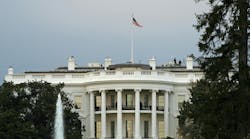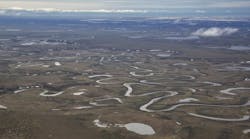Trump propels pro-fossil fuel agenda with day-one orders
President Donald Trump, in his first hours back in the White House, ordered the government to resume processing LNG export permits, reversed the previous administration’s actions to close parts of Alaska and federal waters to oil and gas development, pumped the brakes on the transition to electric vehicles and bid adieu to the Paris climate accords.
Trump also declared a national energy emergency that he said gives him authority to lessen environmental restrictions on oil and gas projects and streamline permitting for new energy infrastructure to “unleash American energy dominance.”
The energy emergency declaration and other administrative moves to ease energy permitting will likely face legal challenges unless Congress also acts. The new Congress should make energy-permitting reform, with changes to the National Environmental Protection Act, a top legislative priority, industry representatives told Oil & Gas Journal.
US LNG permits
Trump threaded the needle on LNG, effectively reversing the export-permit pause Biden put in place in early 2024 while the government studied the environmental and economic effects of exporting US natural gas (OGJ Online, Jan. 26, 2024).
By extending the comment period on the Biden administration’s study to Mar. 25, 2025 from Feb. 18, 2025, instead of declaring the pause over, the Trump administration may aid industry by building the rationale for LNG exports.
The industry lobbied Trump’s energy transition team to address the US Department of Energy report that found damage to the environment and the economy outweighed the benefits of new LNG infrastructure (OGJ Online, Dec. 17, 2024).
“The industry wants any new permits to be legally durable,” said Charlie Reidel, president of the Center for LNG. Environmental groups will “certainly” challenge new export authorization, he noted. “LNG sponsors need to feel confident” before they invest $15-20 billion,” he said.
More than a dozen LNG plants in Texas and Louisiana await approval, including Commonwealth LNG, Venture Global's CP2, Cheniere Energy's Sabine Pass expansion, Energy Transfer's Lake Charles terminal, and Sempra's Port Arthur LNG project.
Addressing the study could help already-approved LNG projects currently tied up in the courts, including NextDecade Corp.’s 27-million tonne/year (tpy) Rio Grande LNG plant, by bolstering the legal arguments for exports, said Erik Milito, president of the National Ocean Industries Association (NOIA). A federal appeals court in August 2024 overturned the permit for the plant under construction in Brownsville, Tex., ruling that the Federal Energy Regulatory Commission failed to conduct a robust study of the environmental impacts (OGJ Online, Aug. 6, 2024).
NEPA policy
Trump’s energy emergency declaration takes aim at the National Environmental Policy Act (NEPA) by directing the White House Council on Environmental Quality to coordinate agency-level rewrites to expedite approvals "over any other objectives, including those of activist groups.”
NEPA reform is a major ask of the energy industry, which has seen courts increasingly implement NEPA reviews, which reverse or delay federal project approvals. “NEPA is an important law, but it’s become an albatross” for the oil and gas industry, said NOIA’s Milito.
Federal lands, waters
In day-one executive actions, Trump started the process to reverse the previous administration’s energy and environmental policies, including two orders issued by Biden earlier this month, restricting federal oil and gas leasing in US coastal waters, including all waters off the east and west coasts of the US, as well as the eastern Gulf of Mexico and portions of the Northern Bering Sea in Alaska, from all future oil and gas leasing.
He revoked Biden’s memorandum to make off-limits for future oil and gas leasing 16 million acres of offshore and onshore acreage, including permanently withdrawing 2.8 million acres of the Alaskan Beaufort Sea north of the National Petroleum Reserve-Alaska.
Washington energy insiders expect Congress to force Interior Department agencies, like the Bureau of Land Management (BLM) and the Bureau of Ocean Energy Management (BOEM), to beef up federal leasing plans. Without action by Congress, Trump’s administrative actions related to federal lands and waters could face legal challenges, they say.
Environment, climate
Trump also took first-day action to revoke a 2021 Biden executive to ensure half of all new vehicles sold in the US by 2030 were electric. The policy was order opposed by the oil industry but backed by US and foreign automakers.
Trump again took the US out of the Paris climate deal, repeating a move he made in his first term. He said the accord puts the US at a competitive disadvantage to geopolitical rivals like China.
He also issued orders to rescind Biden’s actions that integrated climate and environmental justice throughout federal agency decision-making.
About the Author
Cathy Landry
Washington Correspondent
Cathy Landry has worked over 20 years as a journalist, including 17 years as an energy reporter with Platts News Service (now S&P Global) in Washington and London.
She has served as a wire-service reporter, general news and sports reporter for local newspapers and a feature writer for association and company publications.
Cathy has deep public policy experience, having worked 15 years in Washington energy circles.
She earned a master’s degree in government from The Johns Hopkins University and studied newspaper journalism and psychology at Syracuse University.


